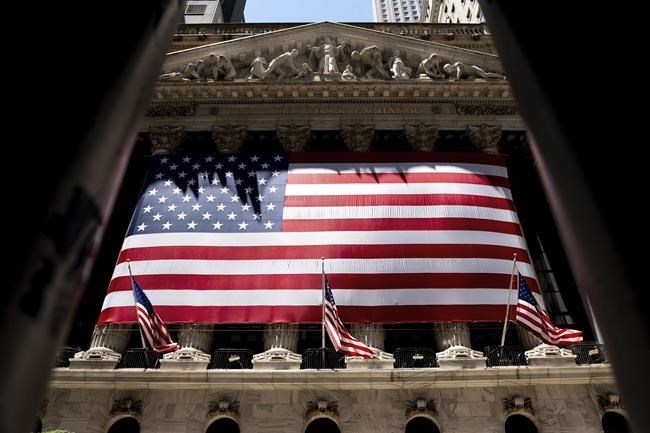NEW YORK (AP) — Most stocks closed lower as the constrictor of higher interest rates tightens its coils around Wall Street. The S&P 500 ended little changed Monday. The Dow Jones Industrial Average fell 74 points, and the Nasdaq composite rose 0.7%. Slumps for oil-and-gas stocks weighed on the market after crude prices gave back some of their sharp gains since the summer. More than three out of four stocks within the S&P 500 fell alongside them, but gains for Apple and other influential Big Tech stocks helped to support indexes. Treasury yields rose further into heights unseen in more than a decade.
THIS IS A BREAKING NEWS UPDATE. AP’s earlier story follows below.
NEW YORK (AP) — Most stocks are falling Monday as the constrictor of higher interest rates tightens its coils around Wall Street.
The S&P 500 was 0.5% lower in late trading, coming off its worst month of the year. The Dow Jones Industrial Average was down 204 points, or 0.6%, as of 3 p.m. Eastern time, and the Nasdaq composite was 0.1% higher.
Slumps for oil-and-gas stocks weighed on the market after crude prices gave back some of their sharp gains since the summer. The majority of stocks fell alongside them, with 85% of S&P 500 stocks dropping, but gains for Apple and some other influential Big Tech stocks helped limit the market’s losses.
Stocks have broadly given back about 40% of their strong gains for the year since the end of July. The main reason is Wall Street’s growing acceptance that high interest rates are here to stay a while as . That in turn has pushed Treasury yields to their highest levels in more than a decade.
The yield on the 10-year Treasury climbed again Monday, up to 4.67% from 4.58% late Friday, and is near its highest level since 2007. High yields send investors toward bonds that are paying much more than in the past, which pulls dollars away from stocks and undercuts their prices.
Stocks that pay high dividends with relatively steady businesses see particular pain because their investors are more likely to switch between stocks and bonds. That puts a harsh spotlight on utility companies. PG&E dropped 6%, and Dominion Energy sank 5.7% for some of the sharpest losses in the S&P 500.
High interest rates also make borrowing more expensive for all kinds of companies, which can pressure their profits. Since the Federal Reserve indicated last month it likely won't cut rates as much in 2024 as earlier expected, the value of the U.S. dollar has also climbed against other currencies. That can mean a painful hit for S&P 500 companies, which get a big chunk of their revenue from abroad.
“If higher-for-longer rates keep the dollar at recent levels, corporate profits will face a genuine headwind,” according to Lisa Shalett, chief investment officer at Morgan Stanley Wealth Management.
Besides hurting financial markets in the aim of lowering inflation, high interest rates slow the overall economy and can cause disruptions in far-flung, unexpected corners of the economy.
The overall U.S. economy has so far been holding up, defying predictions that it would have fallen into a recession by now.
Manufacturing has been one area that's felt the sting of higher rates, and reports on Monday suggested it's still contracting, though perhaps not by as much as expected. A report from the Institute for Supply Management said U.S. manufacturing shrank in September for an 11th straight month.
More encouraging for Wall Street was that the report also indicated prices were easing in September. That could mean less pressure on inflation, which has been feeling heat recently from fast-rising oil prices.
Crude oil prices pulled back on Monday after charging higher from $70 in the summer. A barrel of U.S. crude fell $1.97 to settle at $88.82. Brent crude, the international standard, also sank. Brent lost $1.49 to settle at $90.71 a barrel.
The drop for oil dragged stocks lower across the energy sector. Exxon Mobil fell 2.3%, and Chevron lost 1.9%.
SmileDirectClub plunged 64.4% to 15 cents after the company that helps people straighten their teeth filed for Chapter 11 bankruptcy protection.
On the winning side of Wall Street, Discover Financial Services rose 5.2% for the biggest gain in the S&P 500. The company gave details about a consent order it received from the Federal Deposit Insurance Corp, requiring Discover Bank to improve its consumer compliance management system. Analysts pointed to how Discover did not receive a fine, which could be seen as a positive for the stock.
Congress over the weekend of the federal government, which threatened to hurt the economy and disrupt the publication of economic data Wall Street finds crucial. But Capitol Hill only temporarily delayed the threat, promising another showdown. Plus, traders are well aware the stock market has held up rather well through past shutdowns.
In stock markets abroad, indexes were lower across much of Europe.
In Asia, Japan’s Nikkei 225 slipped 0.3% despite a from the central bank showing business confidence is on the rise.
___
AP Business Writers Matt Ott and Elaine Kurtenbach contributed.
Stan Choe, The Associated Press



